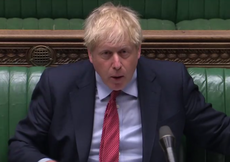If we leave British Isis prisoners to rot in Syrian jails, we learn nothing
I travelled to a jail in northeast Syria to meet self-confessed Isis member Mostefaoui Ishak, to hear his story when nobody else would. Now he is dead and will never get his wish of standing trial in the UK

Ishak Mostefaoui shuffled into the room slowly, wearing the orange jumpsuit given to all the prisoners here. He looked gaunt and sported a bandage on his head. His skull was fractured months earlier, he said, and his memory was still hazy. He looked broken, but he spoke clearly, and in detail, about how he said he spent his days during his time in the Isis caliphate.
I had come to Hassakeh, in northeast Syria, in November last year to interview him in the jail where he was being held along with thousands of other Isis suspects by Kurdish forces. I watched many tired and defeated Isis fighters rounded up as they left the last Isis-held village of Baghouz during the fall of the Isis caliphate months earlier.
Mostefaoui, 27, was a self-confessed Isis member. He travelled to Syria in 2014 after telling his family that he was going to Amsterdam for a short trip. He joined Isis shortly after his arrival, and while there he claimed to have carried out only administrative tasks for the terror group.
His fate was unknown until a journalist came across him in the same jail in September, some six months after the caliphate’s fall. When we met, under the supervision of guards, he said he wanted to come back to the UK. He argued that, whatever he had been accused of, he had the right to a trial in his home country.
“If we go back home, and we get taken to court and we are found guilty of whatever crimes they see as a crime, I’ll put my hands up and do my time for that. And I’ll go out. This is what democracy is,” he said. “I regret everything I’ve done. I want to start a new page,” he added, while not admitting to any particular crimes.
He wouldn’t get that chance. According to reports, he died at the jail within the last two weeks, some nine months after our meeting. Conflicting reports suggested that he was killed either during a disturbance among prisoners or an escape attempt.
His death is likely to reignite the debate over the UK’s policy of refusing to bring back its citizens to face trial at home, arguing instead that they face trial where they were detained – in this case, in a fledgling semi-autonomous region of northeast Syria.
“Since 2011, the Foreign and Commonwealth Office has advised against all travel to Syria,” a government spokesperson told me when I asked whether Mostefaoui’s death would impact the policy.
“Those who chose to leave the UK and fight for, or support, Daesh potentially pose a very serious national security risk,” they added.
That risk is another part of the reasoning for leaving the suspects there. Securing a conviction in a UK court for someone like Mostefaoui would be difficult. There is little evidence to prove how these Brits spent their time in Syria.
It is a policy that may give satisfaction to those who believe a special class of punishment should exist for Isis suspects, but it is one that also robs Isis victims of answers, and looks increasingly like a de-facto death penalty for the unconvicted.
I felt it was important to interview Mostefaoui and other Isis prisoners because I wanted to know what led these young men to join the terror group, what they did while they were there. The British government has even refused to interview them in custody, forfeiting a full understanding of why and how they were radicalised, and the nature of the crimes they committed. The vital task of putting these pieces together has been left to the few journalists who would venture to these squalid prisons.
The particular jail where Mostefaoui was being held was converted from a school. It was clear to me then that the building was not equipped to handle the roughly 5,000 suspected Isis members it held. The prisoners were crowded 100 to a cell and the overcrowding was causing disease to spread – one guard said nearly half of the inmates were suffering from some kind of medical condition.
The Kurdish-led Syrian Democratic Forces, which controls the region where the estimated 10 to 30 British suspected Isis members are being held, had called repeatedly for countries to take back their citizens who joined Isis. Many of the victims of the terror group, too, have argued that the trial of these men is the only way to serve justice.
It’s a strange thing to interview one of your countrymen in such a dark place, especially someone so close to my age (only seven years separate us). I had interviewed Isis prisoners before, but usually through a translator. None of them had an east London accent.
Despite his injuries, Mostefaoui seemed sharp. I wasn’t sure how to read him. At times he seemed calculating and rehearsed, at others hopelessly naive.
His story was similar to many other Brits that came before him. In 2013, he was studying economics at Westminster University when friends said he became more extreme. The next year, he and fellow student Zakariyya Elogbani travelled together to Syria. They were among seven students from the same university to join Isis. Among them was Mohammed Emwazi, also known as Jihadi John, the Isis executioner.
“One of my dad’s friends had a Syrian family. And he was chatting to me about how the Syrian people were being repressed at the time of the revolution and before. And on social media, Twitter, Facebook and all that, we saw people crying for help,” he told me.
When he arrived, Mostefaoui said he married a Syrian woman and set out to start a family. Like most captured Isis members, he denied being a fighter, but admitted to doing administrative work for the group.
Mostefaoui left Baghouz while unconscious after being severely injured in a US-led coalition airstrike. His wife and young son were killed in the strike. He said his skull was fractured in the blast, and wore a bandage around his head. When pressed about whether he was involved in fighting or the war crimes that the group carried out, his answers were vague.
“I never saw any slaves or was taking part in these kinds of acts. I heard the news like any other guy. But you can’t blame the mass for something the [leadership] was doing,” he said.
I disagreed with him then, of course. Many who went to join Isis did so in the full knowledge that the group was already committing heinous atrocities and war crimes, and went to participate in them.
My meeting with Mostefaoui lasted for just half an hour. The resulting interview, and the few others he gave to other journalists, make up a fraction of what could have been learned about his time in the caliphate were he to have faced trial. But when he died, he took with him the answers to questions that many have not yet had the chance to ask.





Join our commenting forum
Join thought-provoking conversations, follow other Independent readers and see their replies